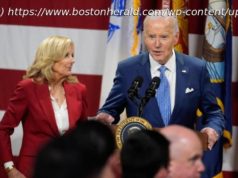WASHINGTON (AP) – The government announced a $12 billion plan Tuesday to assist farmers who have been hurt by President Donald Trump’s trade disputes with…
WASHINGTON (AP) – The government announced a $12 billion plan Tuesday to assist farmers who have been hurt by President Donald Trump’s trade disputes with China and other trading partners.
The plan focuses on Midwest soybean producers and others targeted by retaliatory measures.
The Agriculture Department said the proposal would include direct assistance for farmers, purchases of excess crops and trade promotion activities aimed at building new export markets. Officials said the plan would not require congressional approval and would come through the Commodity Credit Corporation, a wing of the department that addresses agricultural prices.
« This is a short-term solution that will give President Trump and his administration the time to work on long-term trade deals, » said Agriculture Secretary Sonny Perdue.
Officials said the direct payments could help producers of soybeans, which have been hit hard by the Trump tariffs, along with sorghum, corn, wheat, cotton, dairy and farmers raising hogs. The food purchased from farmers would include some types of fruit, nuts, rice, legumes, dairy, beef and pork, officials said.
In Kansas City, meanwhile, Trump told a veterans’ convention that he was trying to renegotiate trade agreements that he said have hurt American workers, and he asked for patience ahead of key talks.
« We’re making tremendous progress. They’re all coming. They don’t want to have those tariffs put on them, » Trump told the Veterans of Foreign Wars national convention. « We’re opening up markets. You watch what’s going to happen. Just be a little patient. »
Agriculture officials said the payments couldn’t be calculated until after harvests come in. Brad Karmen, the USDA’s assistant deputy administrator for farm programs, noted that the wheat harvest is already in, so wheat farmers could get payments sooner than other growers.
But officials said soybeans were likely to be the largest sector affected by the programs.
Trump declared earlier Tuesday that « Tariffs are the greatest! » and threatened to impose additional penalties on U. S. trading partners as he prepared for negotiations with European officials at the White House.
Tariffs are taxes on imports. They are meant to protect domestic businesses and put foreign competitors at a disadvantage. But the taxes also exact a toll on U. S. businesses and consumers, which pay more for imported products.
The Trump administration has slapped tariffs on $34 billion in Chinese goods in a dispute over Beijing’s high-tech industrial policies. China has retaliated with duties on soybeans and pork, affecting Midwest farmers in a region of the country that supported the president in his 2016 campaign.
Trump has threatened to place penalty taxes on up to $500 billion in products imported from China, a move that would dramatically ratchet up the stakes in the trade dispute involving the globe’s biggest economies.
Sen. Charles Grassley, R-Iowa, said the administration’s move was « encouraging for the short term. What farmers in Iowa and throughout rural America need in the long term are markets and opportunity, not government handouts. »
Indeed, the plan magnified objections among many Republicans that the tariffs amount to taxes on American consumers. House Speaker Paul Ryan of Wisconsin said lawmakers are making the case to Trump that tariffs are « not the way to go. »
Sen. Bob Corker, R-Tenn., said the administration « finally seems to understand that the Trump-Pence tariffs are hurting the American people. These tariffs are a massive tax increase on American consumers and businesses, and instead of offering welfare to farmers to solve a problem they themselves created, the administration should reverse course and end this incoherent policy. »
Before departing for Kansas City, Trump tweeted that any U. S. trade partner needs to either negotiate a « fair deal, or it gets hit with Tariffs. It’s as simple as that. »
The rhetoric came as the president has engaged in hard-line trade negotiations with China, Canada and European nations, seeking to revise trade deals he says have undermined the nation’s manufacturing base and led to a wave of job losses in recent decades.
The imposition of punishing tariffs on imported goods has been a favored tactic by Trump, but it has prompted U. S. partners to retaliate, creating risks for the economy.
Trump has placed tariffs on imported steel and aluminum, saying they pose a threat to U. S. national security, an argument that allies such as the European Union and Canada reject. He has also threatened to slap tariffs on imported cars, trucks and auto parts, potentially targeting imports that last year totaled $335 billion.
The president is meeting with European Commission President Jean-Claude Juncker on Wednesday. The U. S. and European allies have been at odds over the president’s tariffs on steel imports and are meeting as the trade dispute threatens to spread to automobile production.
__
Associated Press writers Jill Colvin and Lisa Mascaro in Washington contributed.
__
On Twitter follow Ken Thomas at https://twitter.com/KThomasDC
Copyright 2018 The Associated Press. All rights reserved. This material may not be published, broadcast, rewritten or redistributed.






